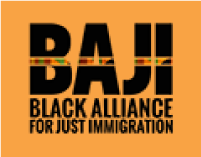BAJI Demands Equitable Protections for Black Migrants
US Can Provide Protection to Black Migrants Fleeing War but Doesn’t Because They’re not Ukrainians
By Ronald Claude (BAJI Policy Director) and Erica Baganza (BAJI Policy Manager)
It is evident to us at the Black Alliance for Just Immigration (BAJI) that the United States is quite capable of creating and implementing immigration policies that help migrants in crisis, as evidenced by the welcoming treatment afforded Ukrainians fleeing war to the United States. It is also clear that once again the United States has chosen to perpetuate the racial inequality in its disparate treatment of Haitian and other Black migrants also seeking refuge from deadly harm.Not only is this stark difference in the treatment of migrants a human rights violation, it is also disgusting, uncompassionate, and yet another way in which the Biden Administration has failed to uphold their promise to advance racial equity in this country.
Within five months of Russia’s invasion of Ukraine in February 2022, the United States granted the entry of over 100,000 Ukrainian migrants through four main pathways of entry: Temporary Protected Status (TPS), Unite for Ukraine (U4U), parole at U.S. ports of entry, and the traditional refugee system. The U.S. government moved swiftly to designate TPS to Ukrainans within weeks after the conflict began, allowing those on temporary visas to remain in the U.S. through October 2023. This is in stark contrast to TPS designation for Cameroonians who were granted TPS status in June of 2022, nearly five years after conflict began in September 2017. What is different is the urgency that Ukrainians experienced versus Cameroonians.
Furthermore, the United States developed the U4U, a private sponsorship program for Ukrainians designed to allow any U.S. citizen to become their sponsors. Sponsors would provide financial and housing assistance and support Ukrainian families navigating employment opportunities and the healthcare system. The processing times, approval rates, and application requirements again prove preferential treatment for Ukrainians when compared to other parole programs, such as the Haitian Reunification Program (HRP) or programs for Afghan nationals . In comparing the application process between the U4U and HRP programs, all requirements such as a significant monetary fee, an in person interview with the US Consulate, and in-person or mail-in only submission were completely waived for Ukrainian migrants. By June 2022, data shows the U.S. paroled 82% of Ukrainian migrants in comparison to just 9% of Black migrants in the same timeframe.
The only clear difference we can ascertain in the United States’ response to the situation Ukrainian migrants face versus Black migrants is that Ukrainian migrants are not Black. Cameroonians, Haitians, Ethiopians, and any other Black migrant seeking asylum are in just as much need of protections and basic human necessities as Ukrainian migrants. We demand that the Biden administration live up to their campaign promise to create a dignified and compassionate immigration system and to legislate and implement immigration policies that respect the human rights of Black migrants.
